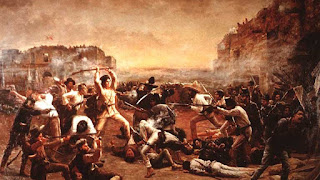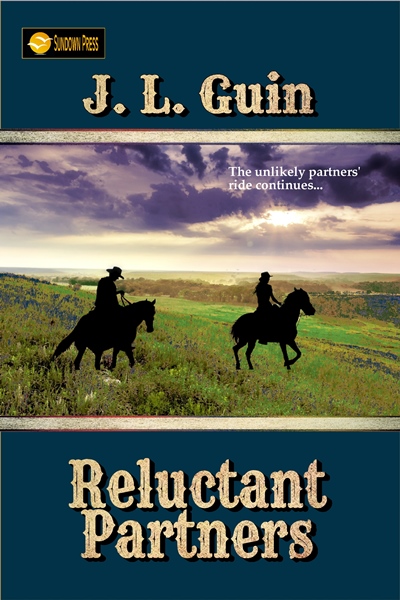I’ve been fortunate enough to receive wide acclaim
already for my Sundown Press novel THE PEACEMAKER. Of 25 reviews
and ratings 2 are 4 star, 23 5 star! This includes 5 star reviews from 2 of the
most successful western authors. Spur award-winning and Pulitzer
Prize-nominated author ROBERT VAUGHAN describes it as ‘a great book’. Meanwhile
RALPH COTTON (also a Pulitzer-prize nominated novelist) writes: ‘For pure
writing style, McBride’s gritty prose nails the time and place of his story
with bold authority. …this relatively new author has thoroughly, and rightly
so, claimed his place among the top Old West storytellers.’ I’m very grateful
to both Robert and Ralph for their fantastic support.
I talk about westerns and my writing, including THE PEACEMAKER. Scott
very kindly agreed to the interview appearing on the Sundown Press blog also.
Questions in bold.
1. When—and
why—did you first fall in love with Westerns?
As a kid
growing up in England in the 60s I fell in love with westerns watching movies
and shows on TV. I was particularly taken by ‘The High Chaparral’ TV series, its Arizona location photography and
the background of the Apache Wars, which sparked a life-long interest in Native
American history and culture.
In the
70s when I was entering adulthood I had a pal who turned me on to reading
westerns, starting with the ‘McAllister’ series by MATT CHISOLM.
2. Who are your three favorite Western
writers?
The first
of several impossible questions you’re going to torture me with during this
interview. I have to pick three out of the likes of Ralph Cotton, Fred Grove,
Louis L’Amour, Glendon Swarthout, Robert MacLeod, A. B. Guthrie Jnr., Lewis B.
Patten, Jack Schaefer, Dorothy M. Johnson, Charles Neider etc.? Three who I
followed fairly slavishly when I was cutting my teeth on reading westerns were WILL
HENRY, GORDON SHIRREFFS and MATT CHISOLM – I devoured Chisolm’s ‘McAllister’
series, and then found out he was British, which inspired me – so let’s go with
those three.
3. Which Western do you wish you’d written?
‘Hondo’ by LOUIS L’AMOUR. In some ways
Hondo is the template western hero and I’m sure my main character in all my
westerns, Calvin Taylor, owes something to him. Once, to warm myself up for a
writing project, I re-wrote the first chapter of ‘Hondo’ and then had to stop myself from re-writing the whole novel!
I think that would be an interesting exercise for another Scott Harris-helmed
’52 weeks’ project – get us lesser mortals to follow in the footsteps of the
greats and re-write, in our own words, a chapter from a classic western
novel.
4. What is the most recent Western you’ve
read?
5. The “Desert Island” question.
What
are your three favorite Western books?
Impossible
to say – but as you’ve cornered me I’ll play along. ‘Little Big Man’ by THOMAS BERGER, which deals with tragic events
and yet manages to be extremely funny in places, and has subtleties the film
lacks;
‘Blood Brother’ by ELLIOTT ARNOLD, which
deals with the Apache chief Cochise and had a huge influence on my writing,
particularly ‘The Peacemaker’;
and ‘The Buffalo Soldiers’ by JOHN PREBBLE which
tackles numerous western clichés in a startling and original way. I don’t think
you’ll find a better written western. And Prebble was also a Brit!
What are your three favorite Western movies?
Even more unanswerable than the ‘3 books’ question. But as John Wayne and John
Ford were, IMHO, the two most important people in western movie history one
would have to be a combination of their talents. Which boils down to a
wrestling match between ‘Stagecoach’
and ‘Fort Apache’ – I think I’ll go
for ‘Fort Apache’.
John
Wayne and Henry Fonda in ‘Fort Apache’
(1948)
‘Ride the High Country’ for its
elegiac quality and the wonderful performances of Randolph Scott and Joel
McCrea.
Randolph
Scott and Joel McCrea in ‘Ride the High
Country’ (1962)
‘Hombre’ which is based on a great ELMORE
LEONARD novel that almost made it into my ‘best 3 books’ list.
Paul
Newman in ‘Hombre’ (1967)
6. Of
the books you’ve written, which is your favorite—and why?
THE
PEACEMAKER. I like all my first five published books, but they were of
necessity short, which meant they had to be action-centric, dependent on a fast
pace. With a longer book like THE PEACEMAKER I could slow down a bit, spend
more time on character and atmosphere. I got to play around with a real
historical person – in this case Cochise. I was able to write a proper love
story. I could provide what John Ford called ‘grace notes’ in his movies,
quiet, reflective bits where not much happens but they give the story added
texture and depth. I was very grateful to my publishers for letting me do that.
7. What is the most recent Western you’ve written?
The most
recent western item I’ve finished is my short story ‘Spectres at the Feast’ which you were kind enough to include in
your excellent ‘The Shot Rang Out’
anthology.

8. Can you tell us anything about your next
book?
I’m going through a slightly frustrating time at the moment. I have one
project that won’t die! In other words it’s proving difficult to finish it off.
I’m stalled on several others, waiting for responses from publishers etc. I did
make a start on a new western, which has an elegiac, end-of-the-west quality
and I’m keen to get stuck into it, but tidying up other projects keeps
preventing me from having a clear run at it.
9. If you could go back in time, what would be
the time and place in the Old West you’d like to have lived in for a year?
I’d only want to pop back for a few hours. I’m an Alamo buff, so I’d love to
solve the eternal mystery of what happened there on the morning of March 6th
1836, particularly to Davy Crockett. However, if I did find myself in the
middle of the final assault on the Alamo I’d like to be both invisible and
invulnerable, to avoid all the bullets, cannon balls and bayonets in the neighbourhood!

10. Is there a question you’d wish I asked?
The
answer?
No. Answering
questions 2 and 5 was traumatic enough!
BLURB for THE PEACEMAKER:
Eighteen-year-old scout Calvin 'Choctaw' Taylor
believes he can handle whatever life throws his way. He’s been on his own for
several years, and he only wants to make his mark in the world. When he is
asked to guide peace emissary Sean Brennan and his adopted Apache daughter,
Nahlin, into a Chiricahua Apache stronghold, he agrees—but then has second
thoughts. He’s heard plenty about the many ways the Apache can kill a man. But
Mr. Brennan sways him, and they begin the long journey to find Cochise—and to
try to forge a peace and an end to the Indian Wars that have raged for so long.
During the journey, Choctaw begins to understand that there are some things
about himself he doesn’t like—but he’s not sure what to do about it. Falling in
love with Nahlin is something he never expected—and finds hard to live with.
The death and violence, love for Nahlin and respect for both Cochise and Mr.
Brennan, have a gradual effect on Choctaw that change him. But is that change
for the better? Can he live with the things he’s done to survive in the name of
peace?
EXTRACT:
Choctaw blinked sweat and sunspots out of his eyes and began to lower the field
glasses; then he glimpsed movement.
He used the glasses again, scanning nearer ground, the white sands. He saw
nothing.
And then two black specks were there suddenly, framed against the dazzling
white. They might have dropped from the sky.
They grew bigger. Two horsebackers coming this way, walking their mounts. As he
watched they spurted into rapid movement, whipping their ponies into a hard run
towards him.
The specks swelled to the size of horses and men. Men in faded smocks maybe
once of bright colour, their long hair bound by rags at the temple. They had
rifles in their hands.
Breath caught in Choctaw’s throat. Fear made him dizzy. His arms started to
tremble. He knew who was coming at him so fast.
Apaches.
And you killed them or they killed you.
****































